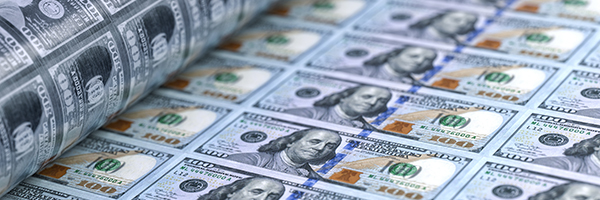All Posts

Dr. Oz appointment news drives up Medicare Advantage stocks today
Health insurers traded higher today, November 20, after President-elect Donald Trump picked TV personality Dr. Mehmet Oz to head the U.S. Centers for Medicare and Medicaid Services, the agency responsible for overseeing healthcare coverage for millions of Americans.

Special Report: “3 Strategies and 10 Picks for Juicy Returns in a Yield Drought”–first 6 picks
If you’re an investor looking for income, you’re facing what I’d call a Yield Drought. And this is no temporary dry spell. Things on the income investing front look they’ll get worse before they get better. Unless a financial crisis intervenes in 2025 to make everything else much worse and the yield story much better. Because, you see, there are two parts to the current Yield Drought.

Please watch my YouTube video: Quick Pick Goldman Sachs
Today’s Quick Pick is Goldman Sachs (GS). This is not a cheap stock. Goldman has had a good run in 2024 and is up 55% year to date. But this is the stock to use play the financial deregulation policies of the Trump administration. We’re moving from Biden’s administration that had a relatively high degree of scrutiny in merger and acquisition deals to an administration that will come close to approving any deal Wall Street proposes. The deal pipeline is full. Companies that were waiting on the election results to move deals forward will start the process as soon as the new President is inaugurated. Running an M&A deal is incredibly lucrative for an investment bank. Goldman Sachs is a big player in this market and will benefit from doing M&As and LBOs. This pick is how I’ll be playing the Trump financial deregulation and I’ll be adding it to my Jubak Picks portfolio tomorrow.

Gold is up today on Ukraine worries, but the trend points up for all of 2025
Gold will rally to a record next year on central-bank buying and U.S. interest rate cuts, according to Goldman Sachs. The investment bank listed the metal among top commodity trades for 2025. “Go for gold,” analysts said in a note, reiterating a target of $3,000 an ounce by December 2025.

As the Cop29 climate meeting talks, the world blows through another global heating benchmark
The internationally agreed goal to keep the world’s temperature rise below 1.5C is now “deader than a doornail.” Climate scientists say that 2024 is almost certain to be the first individual year above this threshold.Three of the five leading research groups monitoring global temperatures consider 2024 on track to be at least 1.5C (2.7F) hotter than pre-industrial times. That would make 2024 the hottest year on record, beating the 2023 record. The past 10 consecutive years have already been the hottest 10 years ever recorded. This hasn’t stopped world leaders gathered in Baku from talking about how to achieve this goal.

With stocks looking stalled, Nvidia reports after the close on Wednesday
NVIDIA (NVDA) will release its third quarter results after the market closes on Wednesday. Analysts are forecasting over 80% year over year growth in both revenue and EPS. Several Wall Street firms have raised their price targets on Nvidia ahead of its earnings report, citing strong demand for AI chips and the potential for upside surprises. Analysts from HSBC, Oppenheimer, Susquehanna, Wedbush, Raymond James, and Mizuho have increased their price targets, with HSBC setting the highest at $200. The stock closed at $140.15 on Monday, November 18. On the other hand…

Saturday Night Quarterback says (on a Sunday), For the week ahead expect…
The indicator known as earnings-revision momentum— the ratio of upward versus downward revisions to analysis forecast per-share earnings over the next 12 months for the Standard & Poor’s 500 stocks—-has slumped into negative territory and is hovering near its second-worst reading in the past year, according to Bloomberg.

Watch my new YouTube video: Fed one and done in December?
Today’s video is Fed One and Done in December? On November 13, the CPI inflation numbers showed inflation ticking up slightly, but the market still believes the Fed will cut rates again in December. On November 13, the CME Fedwatch tool had it at 83% odds we’ll get a cut and I think it’s almost certain. However, when the Dot Plot forecast of GDP, inflation, and interest rates is released in December, I think we’ll see much more uncertainty for the future and likely a planned pause. The three major factors poised to affect the economy are a substantial tax cut, high tariffs and the possibility of mass deportations promised by the president-elect. While two of those items may cancel each other out–with tax cuts being massively stimulative and tariffs cutting into growth by 1.5-2 percentage points while raising costs for consumers, the question of deportations remains. Mass deportations could result in a huge labor shortage and disruptions to supply chains, leading to higher prices. The economy will be under a lot of inflationary pressure from these potential policies and it’s likely the Fed will announce a pause until they see how this all shakes out.

The Fed faces an impossible task in 2025
I think we can expect another huge tax cut package to extend the tax cuts from 2017, and a set of tariffs on China, the European Union, and other trading partners with duties of somewhere between 20% and 200%, and an effort to deport 11 million illegal immigrants (and maybe a few legal immigrants too) And in the face of that policy mix I don’t think there’s any way for the Federal Reserve to reach its goals of getting inflation down to 2%, of lowering interest rates from levels left from the pandemic emergency, and of keeping the economy strong enough to prevent unemployment from climbing. Can’t be done. The Fed doesn’t even begin to have the tools to tackle all those challenges at once. And there’s a non-zero and statistically significant chance of a really serious mistake that would take a big bite out of the economy and the prices of financial assets. Can I tell you why I believe this?

CPI inflation creeps higher in October; market still forecasts December interest rate cut
Inflation ticked up slightly on an annual basis in October, the latest evidence that further reductions in inflation are getting hard to achieve. The Consumer Price Index climbed 2.6% from a year earlier, up from September’s 2.4% annual rate, the Bureau of Labor Statistics reported today. Core inflation, which strips out more volatile food and energy prices, held steady at 3.3% annual rate.

Pick #8 Qualcomm in my “10 New Stock Ideas for an Old Rally” Special Report
Today I added Qualcomm as Pick #8 for my Special Report “10 new stock ideas for an old rally.” The stock is already a member of my Volatility Portfolio. Here’s what I wrote

Wall Street and the bond market see fewer interest rate cuts in 2025 from the Fed
Look out for more volatility in the bond market. BlackRock, JPMorgan Chase. and TCW Group have all warned that the bumpy ride is likely far from over. But also expect that the big overall trend for 2024 of rising bond prices and falling yields on hopes for aggressive interest rate cuts from the Federal Reserve is done.

Has inflation stopped slowing? Wednesday’s CPI will tell
With financial markets deeply conflicted about the effects of a Trump Administration’s policies on taxes, the deficit, mass deportations, and sky-high tariffs will have on the economy and interest rates the October Consumer Price Index (CPI) due Wednesday takes on added importance. Wall Street economists expect headline inflation rose 2.6% annually in October, an increase from the 2.4% rise in September. Core inflation, which strips out more volatile food and energy prices, is forecast to have climbed at a 3.3% rate year over year. That would be unchanged from September’s increase.

Saturday Night Quarterback say (on a Sunday), For the week ahead expect…
I expect more breathless speculation on who will fill the most important posts in the Trump Administration that will be sworn in on January 20, 2025. The consensus, which I agree with, is that this administration will be much different than the first Trump team with fewer figures with anything approaching old-style conservative Republican credentials. Thinkoif the contrast between second Trump administration vice-president J.D. Vance and first administration pick Mike Pence. That difference has made any meaningful handicapping of this race for power extremely difficult–even though the issue of who will fill what chair is incredibly important. For investors I think the most important pick to watch is Treasury Secretary.

Watch my new YouTube video: Rally to continue through December; but I’m worried about January
Today’s video is Rally to Continue Through December; I’m Worried About January. While I recorded this video on November 5 (before the election results), I still believed we were looking at a rally through the end of the year. Looking at the patterns of earnings and cash flow, and with the election complete, we’ll continue with this upward movement until January. Generally, rallies happen every December as money managers look to buy to “window dress” their portfolios at the end of the year. Now that the election is over, any pre-election hedges will turn into more cash entering the market in December. Fourth quarter earnings will likely be the best of the year but the problem is that 2025 will not see as much earning growth as 2024. Likely, in January, companies may issue negative guidance for the year ahead. I don’t expect a depression or recession, but I do think we’ll see a slow down/pull back and we’re certainly due for 5-10% correction. Continue to ride the wave through December, and then look to make some profits in January. Selling in the new year will also mean you don’t have to take the tax hit this year



